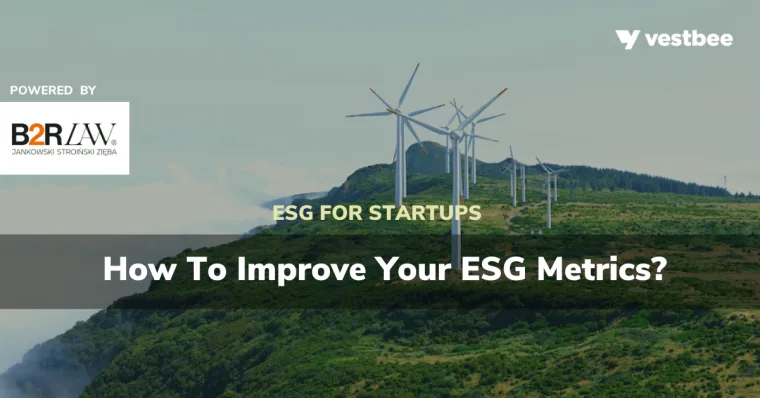ESG issues are growing in importance and will continue to grow reformulating the investment strategies of many VC funds. That’s why, even if ESG reporting is not a new practice, it is quickly becoming a new obligation for many entities, even for those not obliged to report certain ESG issues directly.
The process of ESG reporting itself has been evolving over the years, along with legislative changes and awareness of both business and society.
We see that a significant number of international investors, corporations and financial institutions require from their counterparties and suppliers clear evidence of actions compliant with expected ESG standards (including clear statements and actions indicating support for ideas such as combating global climate change, gender equality or human rights).
Moreover, the impact of ESG is also being reflected internally within business organizations. The issue of taking care of metrics is starting to make itself apparent when potential employees are selecting their place to work.
Additionally, not implementing ESG metrics may lead sooner or later to the loss of sources of funding and turbulence in the supply chain.
It is not surprising that all those interested in the issue are facing a basic question - how to start, develop and improve ESG policies while effectively scaling their business and building a strong position on the market? Here we come with the answer.
First steps with ESG
ESG goals are most easily achieved in parallel with measuring the progress of designated KPIs and identifying areas that require improvement. For a startup, these are the values that show how the startup is progressing towards its goals and targets.
ESG is the easiest thing for startups to set and implement as part of building a business. However, this does not mean that it will be much more challenging for developed company. While a startup can implement appropriate internal policies and set its goals from the very beginning, a developed business very often has many of the expected policies already established, so it should just simply audit the existing policies and adjust them in accordance with the set ESG goals.
The important difference between ESG risk coverage and actual environmental pollution
Contrary to common opinion, ESG is not only about environmental impact, it is also about corporate governance and human rights.
A business whose core relates to low or zero-emission activities without ESG risk coverage will not score highly. Similarly, when the core of the business has a significant negative impact on the environment, it has a chance to be a highly valued entity under ESG criteria because the risks have been properly addressed.
Tailor-made ESG metrics
In the same way that there is no single model set of KPIs, there is no set of ESG goals that should be implemented and measured by metrics. The challenge the market is facing is to properly address the goals to the type of business being conducted.
There are, of course, a number of universal metrics that can address the basic risks associated with ESG. These include, for example, issues of implementation the following policies.
for E – Environmental
- environmental policy and environmental energy consumption
- environmental impact analysis with annual improvement goals
- waste management policy
… which is reflected in such metrics as the reporting of climate emissions, energy consumption, risks and opportunities related to climate, water usage levels, effectiveness of water resource management, business impacts on biodiversity, and waste management.
for S – Social
- diversity policy
- positive discrimination policy
- employment and remuneration policy
- recruitment, promotion, and training policy
- employment, remuneration and turnover structure
- employee association policy
- employee complaint procedure on business ethics and social issues
… which is reflected in such metrics as diversity in supervisory bodies, reporting on equal remuneration, reporting on staff rotation (voluntary, forced), freedom of association and collective negotiations, realization of the policies mentioned above, realization of business ethics principles, the index of granted benefits and additional insurance.
for G - Corporate Governance
- AML procedure
- whistleblower procedure
- anti-corruption policy
- anti-discrimination policy
- human rights and labour policy
- determination of ESG committee rules
- IT data security policy
- implementation of and compliance with RODO
… which is reflected in such metrics as the presentation of the structure of management bodies (includes education), the implementation of the code of ethics, the implementation of the objectives of the internal policies mentioned above, the effectiveness of the mechanism for reporting violations.
ESG vs. Sectors of Activity
For specific industry sectors, however, it is possible to identify the key ESG risks. These may include the following, as applicable to the sectors identified below.
Technology sector - governance, cyber security, business compliance with RODO, supply chain, inclusivity and diversity, energy consumption.
Textile sector - supply chain issues, impact on human rights violations, labor and humanitarian issues, production cost metrics, employee remuneration, production locations, environmental issues.
Real estate sector - particularly expected indicators are those related to sustainable construction in the sense of the Taxonomy, emissions and energy intensity of buildings, waste production during the construction process, labor issues related to respect for human rights and ethical compensation levels.
Financial sector - being touched by corporate governance risks related to credit risk management, proving the proportion of green investments in the investment portfolio, diversity, inclusiveness in governance and oversight structures, and hiring and promotion policies.
Profit for everyone
ESG reporting is a new challenge for business in terms of developing a strategy, activities in accordance with the new legal obligations, as well as the constant monitoring of these obligations.
The positive aspect of the process of implementation and preparation for ESG reporting is undoubtedly the increase of own competitive advantage. Addressing these obligations in a timely manner will create a number of benefits for business development that will be real and, in the end, unavoidable.
Startups should be particularly interested in the implementation of ESG at an early stage of their development. This would undoubtedly make it easier for them to initially function in the chain of service providers, obtaining financing and ending with the effective scaling of the business.
Related Posts:
ESG Due Diligence: The New Standard For Investment Round (by Magdalena Zawiślak, Associate, B2RLaw)
ESG Investment Strategy (by Aleksandra Polak, Partner, B2RLaw)
Your Startup Needs To Be ESG-aligned To Be Investible (by Aleksandra Polak, Partner, B2RLaw)







